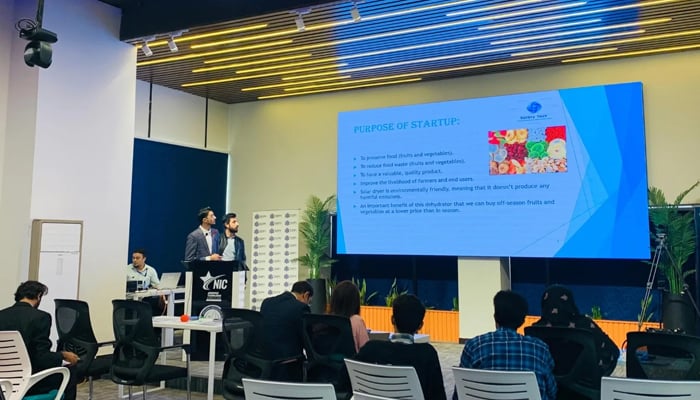Pakistan may face threat if steps not taken to address food insecurity
Islamabad: The speakers at the Food Security Hackathon have called for innovation for food security and regional trade in agriculture through bridging ideas to action through funding partnerships, collaboration, technology and sustainable practices in ensuring food security in Pakistan.
The Hackathon was organised by Sustainable Development Policy Institute (SDPI) in collaboration with the Canadian High Commission and National Incubation Centre for Aerospace Technologies.
Dr Abid Qaiyum Suleri, Executive Director of SDPI, Pakistan may face an existential threat if appropriate measures are not taken immediately to address food insecurity issues. Trade integration with the region provides Hproducts and reduces dependency on limited resources or locally produced goods, he said. He warned that climate change is affecting the agriculture sector of Pakistan and according to UNESCAP, Pakistan may lose more than 9% of its annual GDP due to climate change.
Dr Suleri said that extreme weather conditions will pose a serious threat to the food security of Pakistan in the future, he said adding that Hunger Index 2021 indicates that Pakistan ranked 92 out of 116 countries. Air Commodore Dr Tauseef ur Rehman, National Aerospace Science & Technology Park (NASTP), said that his organisation has taken the initiative to introduce precision agriculture technologies in Pakistan. The project involves a consortium of stakeholders including the public and private sectors, with a focus on drones, supercomputing and advanced sensors.
Leslie Scanlon, High Commissioner of Canada in Pakistan, highlighted Canada's commitment to supporting projects globally, particularly in Pakistan, focusing on food security and climate-resilient agriculture. She emphasised Canada's contributions to the Green Climate Fund and the International Fund for Agricultural Development, along with efforts to promote science-based policies for genetically modified agricultural products.
Dr Vaqar Ahmed, Joint Executive Director, SDPI said that to turn a winning hackathon idea into a successful startup, it is important to refine the idea, validate it, build a prototype, create a business plan, secure funding, network and execute and iterate.
Dr Iqrar Ahmad Khan, Vice Chancellor, University of Agriculture Faisalabad, pointed to root causes such as policy inefficiencies. He emphasised the importance of addressing small farmers' needs and anticipated bright ideas from the hackathon for the commercialisation of knowledge.
Dr Haroon Sarwar Awan, Economic Consultant, Ministry of National Food Security & Research, urged exploration of unexplored areas, particularly in fintech for agriculture, addressing the financial challenges faced by small farmers. He suggested using digital databases and registries to facilitate access to finances, especially for landless farmers in smaller provinces.
-
 Therapist Killed In Office As Former Client Launches Knife Attack
Therapist Killed In Office As Former Client Launches Knife Attack -
 Gaten Matarazzo Brands 'Stranger Things' Final Scene 'nerve-racking'
Gaten Matarazzo Brands 'Stranger Things' Final Scene 'nerve-racking' -
 David Beckham Speaks Out After Son Brooklyn Beckham's Shocking Post
David Beckham Speaks Out After Son Brooklyn Beckham's Shocking Post -
 Sophie Turner Gets Candid About 'imposter Sydrome' Post 'GOT'
Sophie Turner Gets Candid About 'imposter Sydrome' Post 'GOT' -
 When Nicola Peltz's Boyfriend Anwar Hadid Found Solace In Dua Lipa's Arms
When Nicola Peltz's Boyfriend Anwar Hadid Found Solace In Dua Lipa's Arms -
 Claire Foy Reveals Rare Impact Of 'The Crown' Gig On Career
Claire Foy Reveals Rare Impact Of 'The Crown' Gig On Career -
 Megan Thee Stallion Teases New Music On The Way
Megan Thee Stallion Teases New Music On The Way -
 Blonde Kate Stuns In Photos With Prince William During Rare Joint Engagement
Blonde Kate Stuns In Photos With Prince William During Rare Joint Engagement -
 Kate Gosselin Reveals Harrowing Moment Thief Nearly Took Her Down
Kate Gosselin Reveals Harrowing Moment Thief Nearly Took Her Down -
 Billy Bob Thornton Weighs In On Contrast To 'Landman' Role
Billy Bob Thornton Weighs In On Contrast To 'Landman' Role -
 Amanda Holden May Swap Position To Different Reality Show: See Which
Amanda Holden May Swap Position To Different Reality Show: See Which -
 The Truth Behind Victoria Beckham's 'inappropriate' Wedding Dance Video
The Truth Behind Victoria Beckham's 'inappropriate' Wedding Dance Video -
 AI Startup Raises $480 Million At $4.5 Billion Valuation In Earlier Gains
AI Startup Raises $480 Million At $4.5 Billion Valuation In Earlier Gains -
 North Carolina Woman Accused Of Serving Victims With Poisoned Drinks
North Carolina Woman Accused Of Serving Victims With Poisoned Drinks -
 Robert Redford’s Daughter Amy Sings Praises Of Late Father
Robert Redford’s Daughter Amy Sings Praises Of Late Father -
 OpenAI And ServiceNow Team Up To Embed ChatGPT In Business Workflows
OpenAI And ServiceNow Team Up To Embed ChatGPT In Business Workflows




